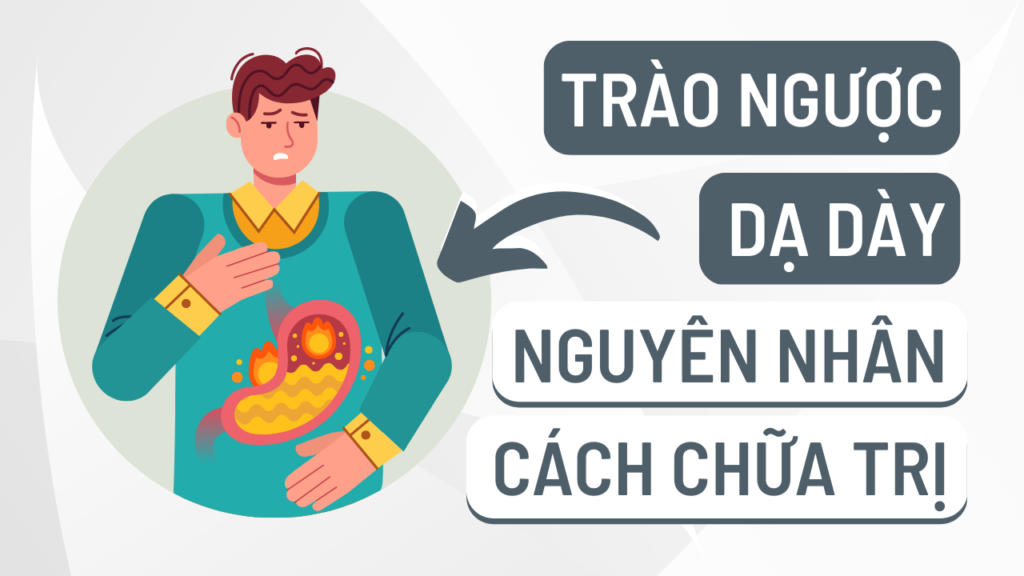Gastroesophageal reflux is a condition that occurs frequently in most of us. It not only causes stomach upset but also affects health. But there are still some of you who take acid reflux lightly because you think it's not dangerous. In this article Nguyen will take a more general view on this issue.
What is Gastroesophageal Reflux?
Gastroesophageal reflux disease (GERD) occurs when stomach acid repeatedly flows back into the tube connecting the mouth and stomach (esophagus). This reflux can irritate the lining of your esophagus.
Symptoms of Gastroesophageal Reflux
Common signs and symptoms of GERD include:
- A burning sensation in the chest (heartburn), often after eating, may be worse at night or while lying down.
- Reflux of acidic foods or liquids.
- Pain in the upper abdomen or chest.
- Having difficulty swallowing.
- Feeling of a lump in the throat.
If you have acid reflux at night, you may also experience:
- Persistent cough.
- Laryngitis cord inflammation.
- New or worsening asthma.
Is acid reflux dangerous?
GERD by itself is not life-threatening or dangerous. But long-term GERD can lead to more serious health problems:
- Esophagitis: Esophagitis is irritation and inflammation caused by stomach acid in the lining of the esophagus. Esophagitis can cause esophageal ulcers, heartburn, chest pain, bleeding, and difficulty swallowing.
- Barrett's esophagus: Barrett's esophagus will be present in some people (approximately 10%) with long-term GERD. The damage acid reflux can cause over many years can change the cells in the lining of the esophagus. Barrett's esophagus is a risk factor for esophageal cancer.
- Stomach cancer: Cancers that start in the esophagus are divided into two main types. One is an adenocarcinoma, which usually develops in the lower part of the esophagus. This type can develop from Barrett's esophagus. The second is squamous cell carcinoma that begins in the cells lining the esophagus. This type of cancer usually affects the upper and middle parts of the esophagus.
- Esophageal stricture: Sometimes the damaged lining of the esophagus becomes scarred, causing narrowing of the esophagus. These narrowings can interfere with eating and drinking by preventing food and liquid from reaching the stomach.
Causes of gastric reflux
These are other common risk factors for acid reflux:
- Eat multiple meals or lie down immediately after a meal.
- Overweight or obesity.
- Eat a heavy meal and lie on your back or bend over at the waist.
- Snack close to bedtime.
- Eat certain foods, such as citrus, tomatoes, chocolate, mint, garlic, onions, or spicy or fatty foods.
- Drink certain beverages, such as alcohol, carbonated drinks, coffee or smoked tea.
- You are pregnant.
- Take aspirin, ibuprofen, certain muscle relaxants, or blood pressure medications.
Some popular ways to reduce gastric reflux
1. Medical treatment
Use medicine:
If you don't see improvement within a few weeks, your doctor may recommend prescription medication and additional testing.
Surgical treatment of gastroesophageal reflux:
Doctors will encourage patients to perform surgery if the symptoms of GERD are too severe.
2. Natural treatment
Combine healthy lifestyle and exercise
Practice a scientific way of eating and practice sports to improve this condition such as Yoga or aerobics, etc.
Have a more suitable, more scientific diet
Having a large amount of food in your stomach can put extra pressure on the valve that keeps stomach acid out of your esophagus. That makes acid reflux and heartburn more likely. Consider eating small meals, making sure to slow down and take the time to chew your food. Avoid eating late, snacking before bed and eating before exercise
Adjust sleeping position
Elevating the head and chest above the legs while sleeping can help prevent and relieve acid reflux and heartburn. Additionally, sleeping on your left side is said to aid digestion and may limit acid reflux.
Take steps to lose weight if you're overweight
Excess weight puts extra pressure on the stomach, increasing the risk of acid reflux and heartburn. Eating a balanced diet and 150 minutes of physical activity per week are the first two steps to maintaining a healthy weight and losing excess weight.
Give up bad habits
Quit smoking because smoking reduces saliva production and affects the effectiveness of the valve that keeps stomach acid from entering the esophagus. Add to that the breaking of bad habits that lead to stress. Because it causes physical harm to your body. These include slowing down digestion and making you more sensitive to pain.
Nguyen hopes that his sharing will help you improve your acid reflux effectively. In addition, Nguyen also has many posts Health and Yoga Therapy. Everyone please support and look forward to Nguyen in the near future!
References
https://www.niddk.nih.gov/health-information/digestive-diseases/acid-reflux-ger-gerd-adults/treatment
https://www.mayoclinic.org/diseases-conditions/gerd/diagnosis-treatment/drc-20361959
https://www.hopkinsmedicine.org/health/treatment-tests-and-therapies/gastroesophageal-reflux-disease-gerd-treatment



